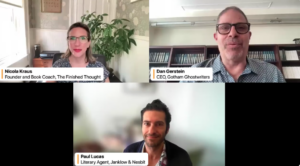Many decades before I ever heard of the name, Gay Talese penned a profile of Frank Sinatra for Esquire magazine without ever having met the singer. The article, published in 1966 and titled, “Frank Sinatra Has a Cold,” became a new standard in the journalism industry and highlighted the writer’s ability to create a new genre of storytelling called narrative non-fiction. In other words, Talese created a literary gem in a time when journalism involved telling the story with just merely facts.
Part of Talese’s success is his ability to observe people and to take interest in their everyday lives. He believes that everyone has a story to tell, no matter how ordinary they may seem. The power of observation, of risk-taking, and of getting people to open up to him, to allow him to enter their lives, made Talese a pioneer in the world of writing and of human connection.
Whether you’re writing fiction or nonfiction, leading a company or working for yourself, the ideas are still the same. Learn to seek out the story beneath the surface. Observe people and listen to your gut. Take risks. Learn to sell your ideas to those who seem skeptical. That said, here are my favorite books that leverage the power of storytelling with success in business.
Malcolm Gladwell, arguably one of the best writers of our time for his ability to combine ideas from across multiple disciplines, introduced us to the story of an art dealer in the beginning of his book, Blink: The Power of Thinking Without Thinking. In the early 1980s, Gianfranco Becchina went to the Getty Museum in California with a proposition — he had a statue called a ‘kourous’ — a rare gem often found badly damaged, in perfect condition. After deliberating for 18 months, and with the help of a scientist who observed the statue under the microscope, the Museum decided to purchase the piece.
Turns out, the statue was a perfect forgery. The truth only came out when several art historians and experts convened at a conference in Greece to observe the statue in greater detail and came to an agreement together. They couldn’t figure out why they felt that way— but they knew, in a matter of seconds after seeing the statue in person that something was not right about it.
What Gladwell did well with this story and the many others in Blink is showcase how important our first instincts are. “Decisions made very quickly can be every bit as good as decisions made cautiously and deliberately,” he says. He posits that in the first few seconds of any given situation, our brain, whether consciously or not, makes an immediate decision with little facts.
Gladwell’s book is perhaps one of the greatest marriages of business and psychology — the way that our brain works when it comes to decision making is perhaps more about intuition than it is about deliberate, conscious thought.
Nowhere is this more prevalent than in the world of sales.
Regardless of what industry or profession you’re in, there will be a point in your life when you will have to become your own salesman —i.e. convince someone to do something for you. Whether it’s buying your product or service or convincing someone to share your content, we are all salespeople at different stages in our lives.
That’s the premise of Daniel Pink’s book To Sell is Human.
To Sell is Human takes the element of scarcity into question. In the book, Pink provides strategies and tips on how to convince others to do things for you, but he also makes the case that the act of selling isn’t nearly as scary as it sounds. The process of ‘selling’ is really a reciprocal act — you give me something in exchange for something I give you. It’s as simple as that. Writers who want to market their content needs to think of sales as a business and a personal transaction. Think of it as building a relationship with people who just happens to be your admirers. Pink’s book is all about understanding the relationship between giving and receiving.
Elsewhere, great storytelling is highlighted in business books such as The Innovation Stack by Jim McKelvey, the co-founder of Square. In it, he told the story of the founding of Bank of America (formerly called Bank of Italy) by an Italian-American named A.P. Giannini in the early 1900s. Why? Because banking was exclusive to upper class individuals at the time and he wanted to provide a welcoming place for everyone to manage their money. The story of Giannini is a story about innovation, of stepping out and finding a solution to an existing societal problem.
Being innovative is hard to do. Stepping out of the status quo is an invitation for a long pauses at dinner conversations, when your colleagues, family or friends respond to your request for seed money to start your business. That’s because humans tend to want to avoid failure. And if you’re not sure where you’re going, it is a recipe for disaster.
The organizational psychologist Adam Grant coined the term ‘originals’ to describe people who are nonconformists, who take action when they know there is a chance for failure. In his book, Originals, Grant tells stories about people and companies who went ‘against the grain,’ who paved the way for more creativity, more ideas, and as a result, making our world a better place.
In reality, what may appear to be astonishing success may be the result of a myriad of choices, actions and failures. That’s the premise of Grant’s book — that in order to be become an original, you must first be unoriginal. “In every field, even the most eminent creators typically produce a large quantity of work that’s technically sound but considered unremarkable by experts and audiences,” he says. In other words, you must first try and fail, then get up and try and try again until you reach that level.
The stories of the greatest triumphs and devastating failures can be summed up in Guy Raz’s book, How I Built This: The Unexpected Paths to Success From the World’s Most Inspiring Entrepreneurs. Raz is the host of the How I Built This podcast on NPR, a podcast about entrepreneurship and business. In the show, he interviews leaders and entrepreneurs and what he calls “idealists” from a variety of disciplines on their journey towards success. Many of the episodes that I listened to this year included stories about trying to convince nonbelievers, about rejection, and laments on lost time, lost sleep and lost money. But it’s also stories about the feeling of exhilaration and relief once the founder realized they had “made it,” a feeling indescribable but incredibly worth it.
These are my top five favorite books that speak to the human side of business. These books teach us that the best lessons in life can be gained by learning about other people’s stories.
Author
-
Hoang Samuelson is a writer living in Oregon. In addition to her newsletter, Letters to a Dear Stranger, her writing can be found in Medium, HuffPost, the Oregonian, Raising Mothers magazine, the Oregon Humanities magazine, and Food52.
View all posts



